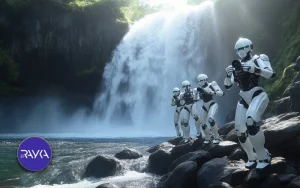
The steps of documentation play an important role in producing impactful and professional documentary films. Documentary filmmaking is not just about recording facts; it is a creative process for narrating real stories through visual language. In today’s world, documentary films have become a powerful tool for informing, raising awareness, and even creating social change. In this article, the documentary production process is explained from idea to distribution.
Documentation refers to the process of planning, research, filming, editing, and narrating a real story in the form of a film. This type of content production is based on facts, and its purpose can be to inform, educate, provide social criticism, or record an important event.
In documentaries, unlike fiction films, the director works with real people and events, but still plays an active role in shaping the film’s message through selecting the point of view, narrative structure, and editing style.
Documentary filmmaking is done for various reasons: sometimes to record a historical event, sometimes to raise awareness about a social issue, and sometimes simply to tell the story of an influential person’s life. Documentaries are powerful in conveying emotions, raising questions, and attracting the audience’s attention. The reasons for making different types of documentaries can include the following:
The documentary filmmaking process consists of a set of creative, research, and technical stages, continuing from the initial idea to final distribution. Below, we get acquainted with the main steps of this process.
The documentary production process begins with the emergence of an idea and the selection of a suitable subject. The filmmaker must answer the question: Why is this topic worth documenting, and what message should be conveyed? Setting a clear objective from the start guides the research, narrative, and even the visual style of the film.
A reliable and impactful documentary relies on a solid informational foundation. This stage plays a crucial role in shaping the narrative and enriching the film’s visuals and content. Information sources must be accurate, diverse, and trustworthy. The main methods for research and data collection include:
Based on the research findings, the filmmaker writes a treatment or an initial script. This script usually outlines the general narrative, main characters, key situations, and narration style. Even in observational or unscripted documentaries, having a preliminary plan ensures coherence and direction in the subsequent stages.
After drafting the initial plan, the filmmaker must make the necessary preparations for executing the project. This phase is heavily focused on field and logistical coordination and plays a key role in the smooth running of the filming process. Important tasks in this stage include:

The duration of documentary filming can range from a few days to several months. During this phase, the filmmaker is faced with real-life events and must make creative decisions to capture each moment.
For smaller projects or when resources are limited, shooting documentaries with a mobile phone is an efficient and flexible option. Whether using professional cameras or smartphones, the main goal is to remain true to reality while presenting a visually compelling narrative.
In the editing stage, all the footage is reviewed, selected, and arranged in a logical order. Editing not only gives the documentary its final structure but also sets the tone and mood of the film. The effective use of sound, music, and effects plays a crucial role in conveying emotions to the audience.
After the initial edit, the filmmaker reviews the film and makes changes to its structure or rhythm as needed. Feedback from experts or a test audience can reveal potential weaknesses. The goal of this stage is to achieve a precise, cohesive, and impactful final version.
The final stage is to deliver the documentary to its audience. Screening at festivals, television broadcast, online release, or limited theatrical runs are all potential methods of distribution. The filmmaker should select the most appropriate distribution channel based on the target audience in order to ensure the message has maximum impact.

In recent years, artificial intelligence (AI) has brought about a remarkable transformation in content creation and documentary filmmaking. From data analysis and identifying social trends to automated text generation and intelligent video editing, AI has elevated the speed, accuracy, and creativity in documentary production to a whole new level.
During the research phase, AI tools equipped with natural language processing can quickly summarize large volumes of data and textual sources, accelerating topic analysis. For editing, AI-based software can automatically select the best parts of the footage, clean up audio, and even generate accurate subtitles. Machine learning algorithms can also assist in emotion detection, speech and image analysis, and even in producing preliminary narration.
At Rayka Mah, we leverage the latest AI technologies to offer creative, fast, and high-quality documentary production services. We have experience producing documentaries where parts of the process; from pre-production to final editing; have been carried out with the help of AI tools, resulting in highly impactful visual and narrative outcomes.
To see samples of our work in this area, visit the Rayka Mah portfolio page and discover the true quality of our outputs.
Documentary production is a complex and meticulous process that requires careful attention to detail at every stage. By following proper documentation steps and leveraging modern techniques such as mobile filmmaking and artificial intelligence, it is possible to achieve higher quality in documentary production.
These methods not only accelerate the production process but also provide access to more accurate and up-to-date information. By collaborating with expert teams like Raykamah, one can create compelling, professional documentaries with impactful messages.
Mobile documentary production has become an attractive option for filmmakers due to its easy accessibility, low cost, and flexibility in filming. This method is especially ideal for short-term projects with limited budgets.
No, all organizations and even individual projects can benefit from documentary production.
Raykamah uses advanced AI technologies and a team of experts to produce high-quality documentaries with impactful messages. To get in touch, contact us on WhatsApp at +98 910 105 3525.